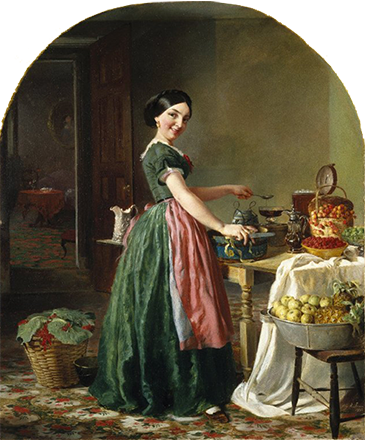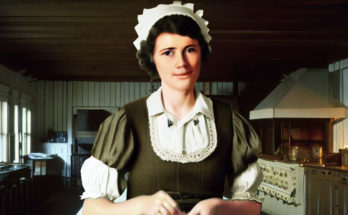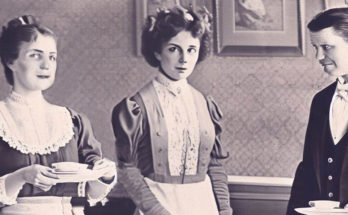
Excerpt from TRIALS AND CONFESSIONS OF A HOUSEKEEPER by T. S. Arthur; PHILADELPHIA: 1859.
WAS there ever a good cook who hadn’t some prominent fault that completely overshadowed her professional good qualities? If my experience is to answer the question, the reply will be—no.
I had been married several years before I was fortunate enough to obtain a cook that could be trusted to boil a potato, or broil a steak. I felt as if completely made up when Margaret served her first dinner. The roast was just right, and all the vegetables were cooked and flavored as well as if I had done it myself—in fact, a little better. My husband eat with a relish not often exhibited, and praised almost every thing on the table.
For a week, one good meal followed another in daily succession. We had hot cakes, light and fine-flavored, every morning for breakfast, with coffee not to be beaten—and chops or steaks steaming from the gridiron, that would have gladdened the heart of an epicure. Dinner was served, during the time, with a punctuality that was rarely a minute at fault, while every article of food brought upon the table, fairly tempted the appetite. Light rolls, rice cakes, or “Sally Luns,” made without suggestion on my part usually met us at tea time. In fact, the very delight of Margaret’s life appeared to be in cooking. She was born for a cook.
Moreover, strange to say, Margaret was good-tempered, a most remarkable thing in a good cook; and more remarkable still, was tidy in her person, and cleanly in her work.
“She is a treasure,” said I to my husband, one day, as we passed from the dining-room, after having partaken of one of her excellent dinners.
“She’s too good,” replied Mr. Smith—”too good to last. There must be some bad fault about her—good cooks always have bad faults—and I am looking for its appearance every day.”
“Don’t talk so, Mr. Smith. There is no reason in the world why a good cook should not be as faultless as any one else.”
Even while I said this, certain misgivings intruded themselves. My husband went to his store soon after.
About three o’clock Margaret presented herself, all dressed to go out, and said that she was going to see her sister, but would be back in time to get tea.
She came back, as she promised, but, alas for my good cook! The fault appeared. She was so much intoxicated that, in attempting to lift the kettle from the fire, she let it fall, and came near scalding herself dreadfully. Oh, dear! I shall never forget the sad disappointment of that hour. How the pleasant images of good dinners and comfortable breakfasts and suppers faded from my vision. The old trouble was to come back again, for the faultless cook had manifested a fault that vitiated, for us, all her good qualities.
On the next day, I told Margaret that we must part; but she begged so hard to be kept in her place, and promised good behaviour in future so earnestly, that I was prevailed on to try her again. It was of no use, however—in less than a week she was drunk again, and I had to let her go.
After that, for some months, we had burnt steaks, waxy potatoes, and dried roast beef to our hearts’ content; while such luxuries as muffins, hot cakes, and the like were not to be seen on our uninviting table.
My next good cook had such a violent temper, that I was actually afraid to show my face in the kitchen. I bore with her until patience was no longer a virtue, and then she went.
Biddy, who took charge of my “kitchen cabinet,” a year or so afterwards, proved herself a culinary artist of no ordinary merit. But, alas! Biddy “kept a room;” and so many strange disappearances of bars of soap, bowls of sugar, prints of butter, etc., took place, that I was forced to the unwilling conclusion that her room was simply a store room for the surplussage of mine. Some pretty strong evidence on this point coming to my mind, I dismissed Biddy, who was particularly forward in declaring her honesty, although I had never accused her of being wanting in that inestimable virtue.
Some of my experiences in cooks have been musing enough. Or, I should rather say, are musing enough to think about: they were rather annoying at the time of their occurrence. One of these experiences I will relate. I had obtained a “treasure” in a new cook, who was not only good tempered and cleanly, but understood her business reasonably well. Kitty was a little different from former incumbents of her office in this, that she took an interest in reading, and generally dipped into the morning paper before it found its way up stairs. To this, of course, I had no objection, but was rather pleased to see it. Time, however, which proves all things, showed my cook to be rather too literary in her inclinations. I often found her reading, when it was but reasonable for me to expect that she would be working; and overdone or burnt dishes occasionally marked the degree in which her mind was absorbed in her literary pleasures, which I discovered in time, were not of the highest order-such books as the “Mysteries of Paris” furnishing the aliment that fed her imagination.
“Jane,” said my husband to me one morning, as he was about leaving the house, “I believe I must invite my old friend Green to dine with me to-day. He will leave the city to-morrow, and I may not have the pleasure of a social hour with him again for years. Besides, I want to introduce him to you. We were intimate as young men, and much attached to each other. I would like you to know him.”
“Invite him, by all means,” was my reply.
“I will send home a turkey from market,” said Mr. Smith, as he stood holding on to the open door. “Tell Kitty to cook it just right. Mrs. Green, I am told, is a first-rate housekeeper, and I feel like showing you off to the best advantage.”
“Don’t look for too much,” I replied, smiling, “lest you be disappointed.”
Mr. Smith went away, and I walked back to the kitchen door to say a word to Kitty. As I looked in, the sound of my feet on the floor caused her to start. She was standing near a window, and at my appearance she hurriedly concealed something under her apron.
“Kitty,” said I, “we are to have company to dine with us to-day. Mr. Smith will send home a turkey, which you must dress and cook in the best manner. I will be down during the morning to make some lemon puddings. Be sure to have a good fire in the range, and see that all the drafts are clear.”
Kitty promised that every thing should be right, and I went up stairs. In due time the marketing came home. About eleven o’clock I repaired to the kitchen, and, much to my surprise, found all in disorder.
“What in the world have you been doing all the morning?” said I, feeling a little fretted.
Kitty excused herself good naturedly, and commenced bustling about to put things to rights, while I got flour and other articles necessary for my purpose, and went to work at my lemon puddings, which were, in due time, ready for the oven. Giving all necessary directions as to their baking, and charging Kitty to be sure to have every thing on the table precisely at our usual hour for dining, I went up into the nursery to look after the children, and to see about other matters requiring my attention.
Time passed on until, to my surprise, I heard the clock strike one. I had yet to dress for dinner.
“I wonder how Kitty is coming on?” said I to myself. “I hope she will not let the puddings get all dried up.”
But, I felt too much in a hurry to go down and satisfy myself as to the state of affairs in the kitchen; and took it for granted that all was right.
A little while afterwards, I perceived an odor as of something burning.
“What is that?” came instinctively from my lips. “If Kitty has let the puddings burn!”
Quick as thought I turned from my room, and went gliding down stairs. As I neared the kitchen, the smell of burned flour, or pastry, grew stronger. All was silent below; and I approached in silence. On entering Kitty’s domain, I perceived that lady seated in front of the range, with a brown covered pamphlet novel held close to her face, in the pages of which she was completely lost. I never saw any one more entirely absorbed in a book. No sign of dinner was any where to be seen. Upon the range was a kettle of water boiling over into the fire, and from one of the ovens poured forth a dark smoke, that told too plainly the ruin of my lemon puddings. And, to cap all, the turkey, yet guiltless of fire or dripping pan, was upon the floor, in possession of a strange cat, which had come in through the open window….
“Kitty!” I don’t much wonder, now, at the start she gave, for I presume there was not the zephyr’s softness in my voice.
“Oh, ma’am!” She caught her breath as her eyes rested upon the cat and the turkey. “Indeed, ma’am!” And then she made a spring towards puss, who, nimbly eluding her, passed out by the way through which she had come in.
By this time I had jerked open the oven door, when there came rushing out a cloud of smoke, which instantly filled the room. My puddings were burned to a crisp!
As for the turkey, the cat had eaten off one side of the breast, and it was no longer fit for the table.
“Well! this is fine work!” said I, in an angry, yet despairing voice. “Fine work, upon my word!”
“Oh, ma’am!” Kitty interrupted me by saying, “I’ll run right off and buy another turkey, and have it cooked in time. Indeed I will, ma’am! And I’ll pay for it. It’s all my fault! oh dear! dear me! Now don’t be angry, Mrs. Smith! I’ll have dinner all ready in time, and no one will be any the wiser for this.”
“In time!” and I raised my finger towards the kitchen clock, the hands of which marked the period of half past one. Two o’clock was our regular dinner hour.
“Mercy!” ejaculated the frightened cook, as she sank back upon a chair; “I thought it was only a little past eleven. I am sure it was only eleven when I sat down just to read a page or two while the puddings were in the oven!”…
“I don’t exactly comprehend this,” said my husband, as he sat down with his old friend, to dine off of broiled steak and potatoes, at half-past two o’clock….
.I related the mishaps of the morning. For desert, we had some preserved fruit and cream, and a hearty laugh over the burnt puddings and disfigured turkey.
Poor Kitty couldn’t survive the mortification. She never smiled again in my house; and, at the close of the week, removed to another home.


